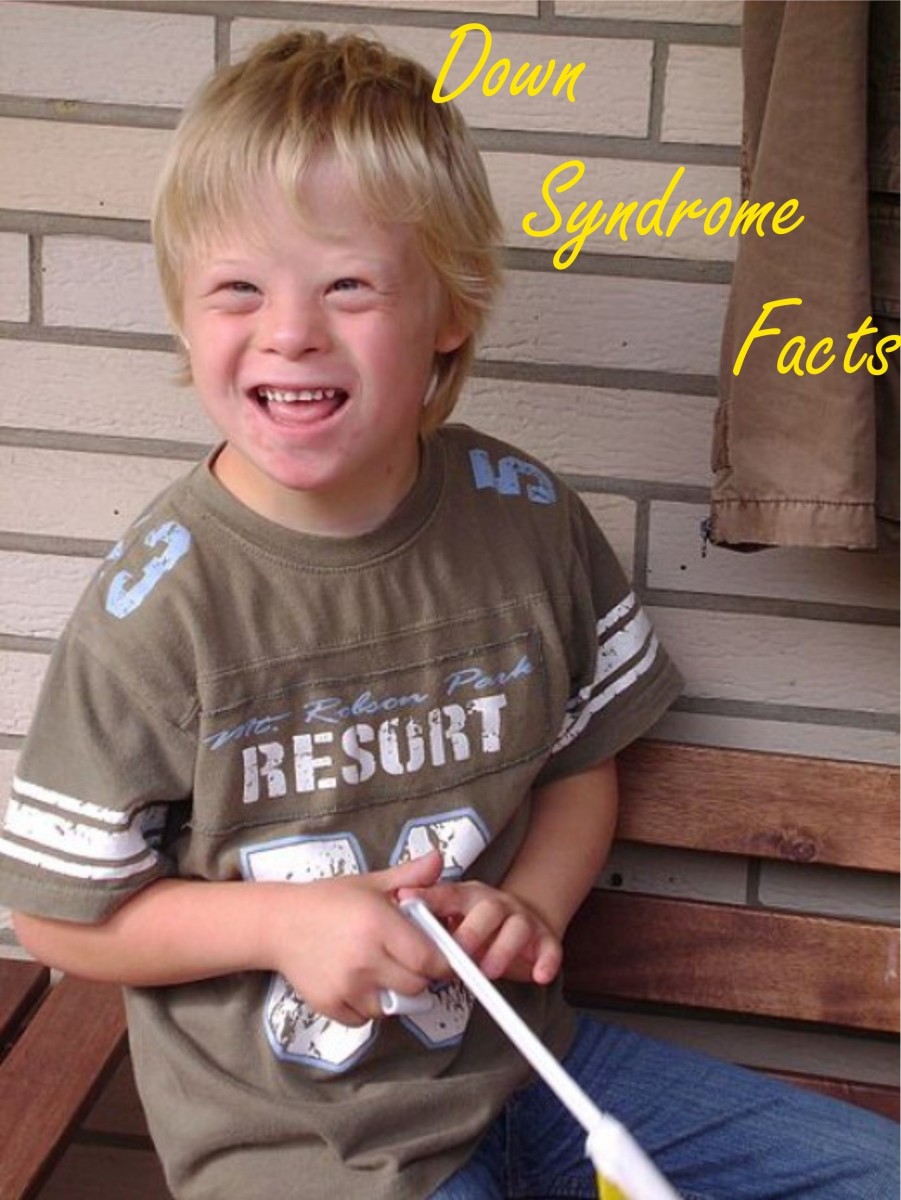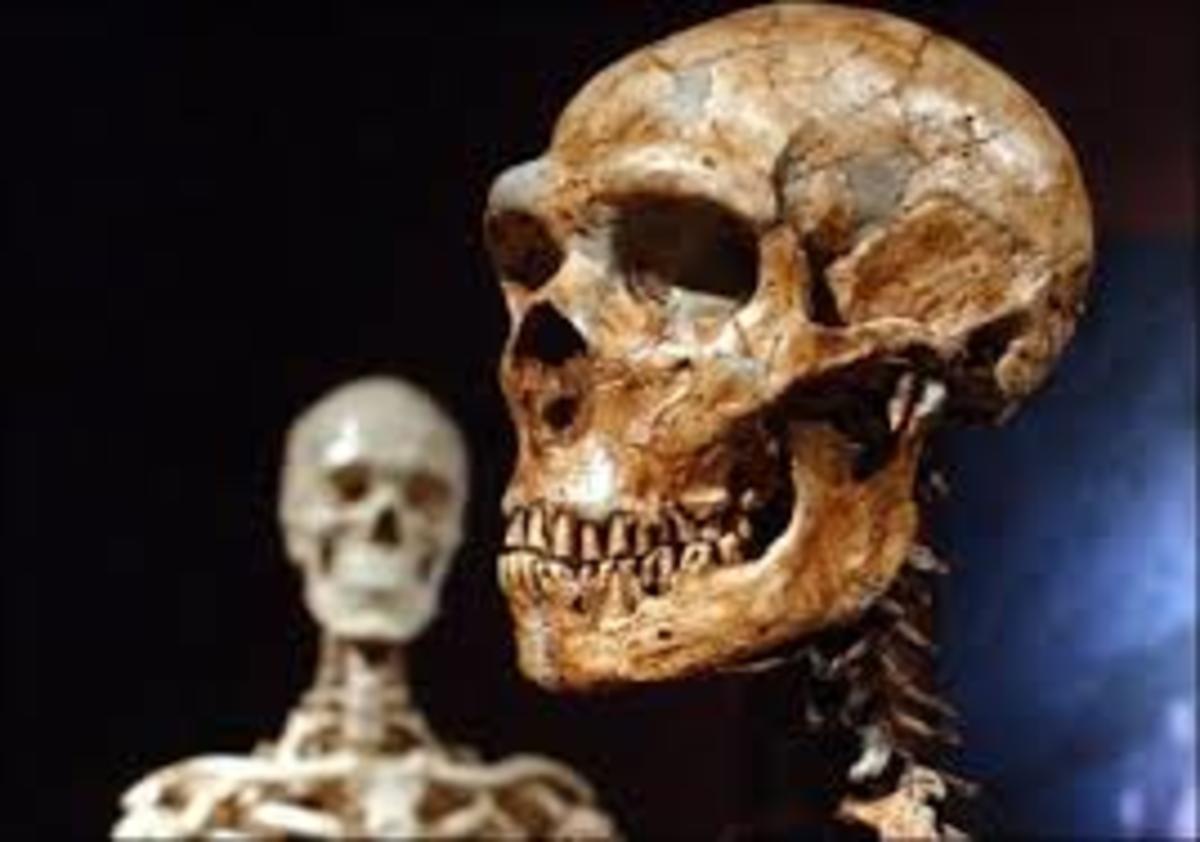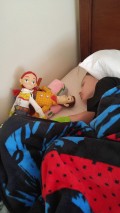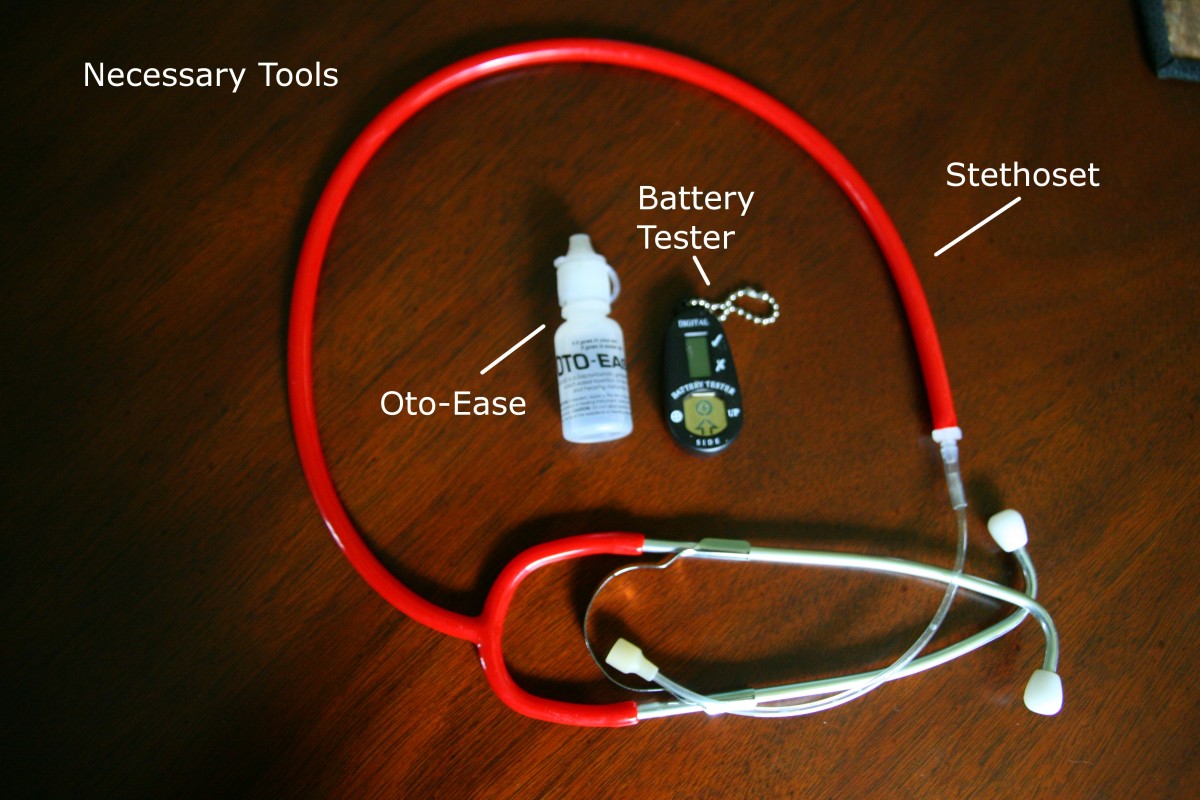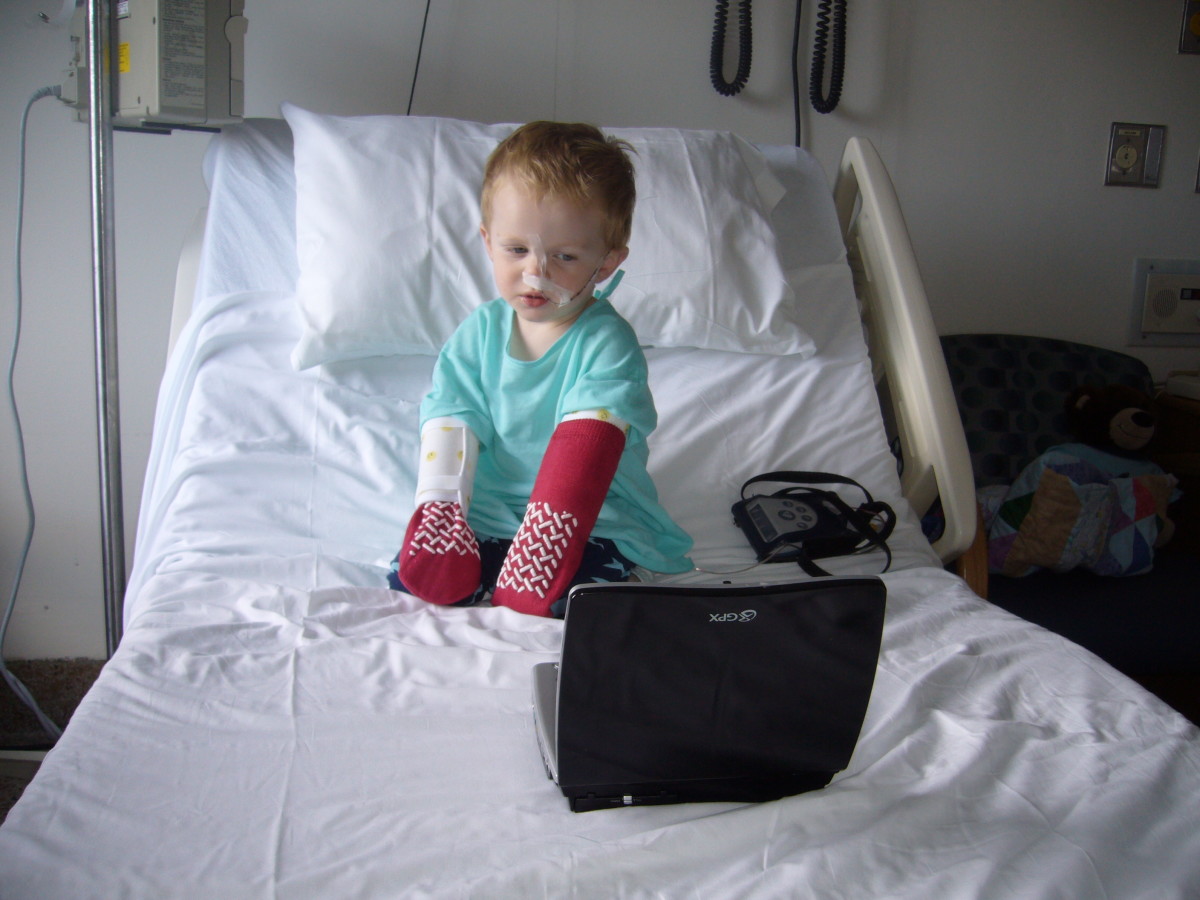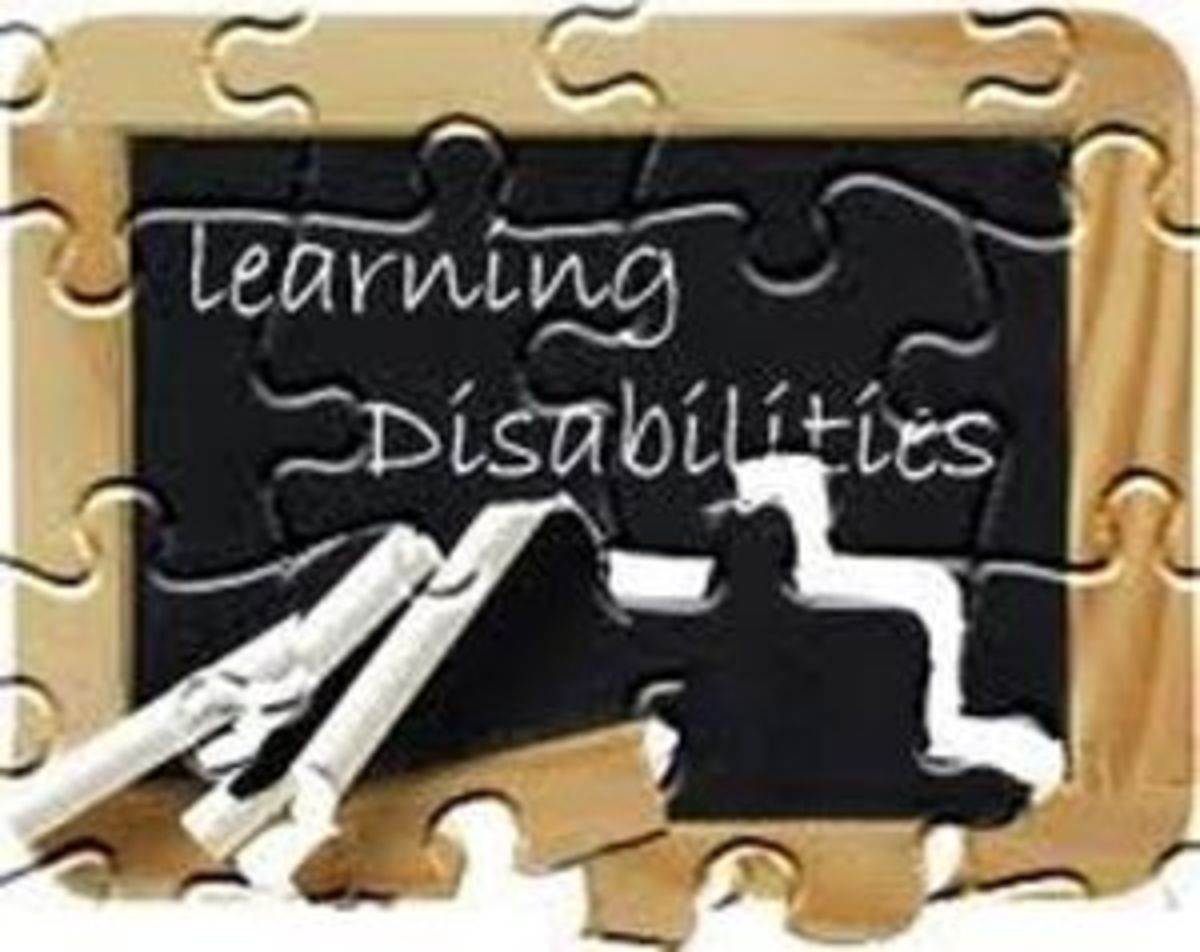Mosaic Down Syndrome-A Grandma's Perspective

Something Amiss
My first and only grandson, Logan, was six months old when I saw him for the first time. I noticed immediately that he looked different to me, but was so enamored by his sweet little angelic face, bright eyes, and adorable smile that I just kind of filed my observation away for later consideration. My son, who was a first time daddy, was beaming with pride and raved about what a good baby his son was. He said, "Mom, he never cries! He is just so content and happy!"
Consequently, I spent the remainder of my son's eight day visit watching my grandson closely. He seemed alert and responsive. He ate well. He cooed and laughed and played, rolled over, and did, indeed, appear normal in every way, with the exception of the fact that he did not cry. My grandson was a very cute little guy, but there were subtle hints of Down Syndrome in his features. His eyes had a slightly almond shape and slant. I noted the shape of his head, shape and position of his ears, his little tongue, that always seemed to protrude, and a distinct gap between his big toes and his other toes. My instincts are usually pretty good, so my initial gut reaction was a fearful suspicion that my grandson may have Down Syndrome. My son told me that the baby had been tested for Down at birth, and the doctor told him and the child's mother that all the test results were normal. My son was so happy and proud of his son that I didn't have the heart to verbalize my fears. I dismissed my fear that something was amiss, and set about being the doting grandma that I am.
One evening, several months later, I received a frantic call from my son. Several ladies from a church where my grandson had been taken had made comments about the baby having Down Syndrome. I took that opportunity to gently tell him that I had suspected this, as well, which he emphatically refuted by reiterating the doctor's test results at birth. I suggested that it might be wise to have Logan evaluated by a genetic specialist, but that suggestion was not well received by either my son or the pediatrician. Yet, I was concerned.
I had a friend who had a 24-year-old Down's son, and I talked to her about Logan. Being the experienced, well-read resource that she was, my friend suggested the possibility of "Mosaic Down Syndrome" and strongly recommended a consult with a genetic specialist. I had never heard the term "Mosaic Down Syndrome" and set out to learn all I could about it, to discover that it was a relatively new discovery about which little was known. Mosaic Down Syndrome had only been acknowledged as a variation of Down Syndrome about five years prior to this. Little research existed to refer to, and Mosaicism was largely an "unknown" in the medical and professional world.
My grandson's pediatrician at the time refused to give a referral for genetic testing, since he had already been tested at birth and found to be "normal". Three years and several doctors later, a referral was finally given and Logan had genetic studies done at the University of Kentucky, where he was diagnosed with "Mosaic Down Syndrome" with a rating of 14%. The ultimate goal of this article is to share what I have learned about "Mosaic Down Syndrome" and raise public awareness of its existence.
What Is It?
Mosaic Down Syndrome, also referred to as Mosaicism, accounts for about 2-4% of all Down Syndrome cases. In layman's terms, as I understand it, DNA, short for deoxyribonucleic acid, is the material found within each cell nucleus that contains the instructions and hereditary patterns for cell reproduction that results in the formation of a living thing. It is made up of chains of chromosomes. Down Syndrome occurs when there is the presence of an extra chromosome, chromosome 21, in the DNA chain caused by an error or misdivision of chromosomes in either the egg or the sperm cell, before they unite to form the fertilized egg called a zygote. All cells subsuquently produced from that zygote with the extra chromosome 21 will also have the extra chromosome, resulting in Down Syndrome, technically known as Trisomy 21.
In contrast, an error or misdivision occurring AFTER fertilization, at some point during the stages of early cell division of the already formed zygote, results in the occurrence of two cell lines, one with the normal number of chromosomes and one with an extra number 21 chromosome. This is referred to as Mosaic Trisomy 21. The term "mosaic" comes from the artistic style of creating a picture from different colored tiles.
Characteristically, a blood test for Down Syndrome is performed either by amniocentesis or CVS during pregnancy, or at birth where white blood cells are studied. The chromosomes in twenty different cells are counted in a procedure called a karyotype analysis. If all the cells counted contain the extra 21 chromosome, the child has Trisomy 21. On the other hand, if two or more of those twenty cells are normal, and the other cells have an extra 21 chromosome, the baby is said to have Mosaic Trisomy 21.
If Mosaicism is suspected, the chromosome specialist, a cytogeneticist, will generally count extra cells within the blood sample to confirm the diagnosis. The degree of Mosaicism is usually determined by a percentage formulated from the ratio of normal cells to cells containing the extra chromosome. It has also been discovered that the double cell lines seen in Mosaicism can be found in other tissues or body parts.
Babies born with Mosaic Down Syndrome CAN, but do not necessarily, have the same features and health problems characteristically seen in Down Syndrome individuals. The presence of cells containing the normal number of chromosomes with the cells having the extra chromosome are thought to result in fewer, or less severe, symptoms than those displayed in Down Syndrome. Unfortunately, studies have shown that the degree to which a child may be affected cannot be predicted by the percentage of normal cells versus Trisomy 21 cells in any given child. A child with Mosaicism can have any range and degree of severity of symptoms, from very mild or no features, to having the majority of features usually seen in a full blown Down's. For example, according to current studies, IQ levels in Mosaic Down Syndrome individuals are on average 10-30 points higher than IQ levels typically seen in persons with Trisomy 21. Only time will tell how any child's development will be affected, as it stands today.
Logan Today
My grandson, Logan, will be six years old in January, and is presently enrolled in a regular kindergarten class. The school system initially wanted to place him in a special education class for Down Syndrome/Autistic children. My son, Logan's dedicated daddy and advocate, insisted that, since Logan is so much more like a regular child than a Down's child, placing him in the special class would be more detrimental to his development and education, than beneficial. The genetic specialist that evaluated Logan told my son that, from what he could tell, the chromosome anomaly in my grandson occurred during the final stage of cell division. He thought that the main areas most likely affected in Logan would involve only his physical features and muscle tone, since those are the systems developed during that phase.
Upon looking at him, Logan has a slight Down's appearance which is not always noticeable. He is extremely limber, more so than any other child I have seen, and has extraordinary strength for his small frame. His speech development was a bit delayed, and he receives ongoing speech therapy, which has certainly helped. He is very verbal and has a pretty extensive vocabulary for his age. Potty training has been challenging, but with consistent cues, he is accident free. He also gets occupational therapy to assist with his motor skill development and abilities. Presently, the degree to which he is physically and mentally affected is mild. He wears glasses due to a degenerative eye disease than can be corrected surgically at the age of seventeen, according to the doctor, and thus far, his heart and other organs are normal and healthy, but will be closely monitored for any changes as he grows. Logan does have some issues with sleep apnea, which the doctors are working on. He is a sweet, affectionate, bright little fellow, with an amazing wit and imagination, and of course, he is the "Apple of my Pie"!
I continue to search for more information and insight into Mosaic Down Syndrome, as it becomes available in order to support my grandson and his parents, and share our experience and knowledge with others who may need it.
For More Information
For more information about Mosaic Down Syndrome, contact Dr. Colleen Jackson-Cook or Lauren Vanner at the Department of Human Genetics at the Medical College of Virginia/Virginia Commonwealth University, P.O. Box 980033 Richmond, Va. 23298-0033. They have published a booklet on this topic that is available free of charge.
SOURCES:
Leshin, Len, MD, FAAP, " Mosaic Down Syndrome", www.ds-health.com/mosaic.htm
Fergus, Kathleen, "What is Mosaic Down Syndrome?", About.com Guide.

